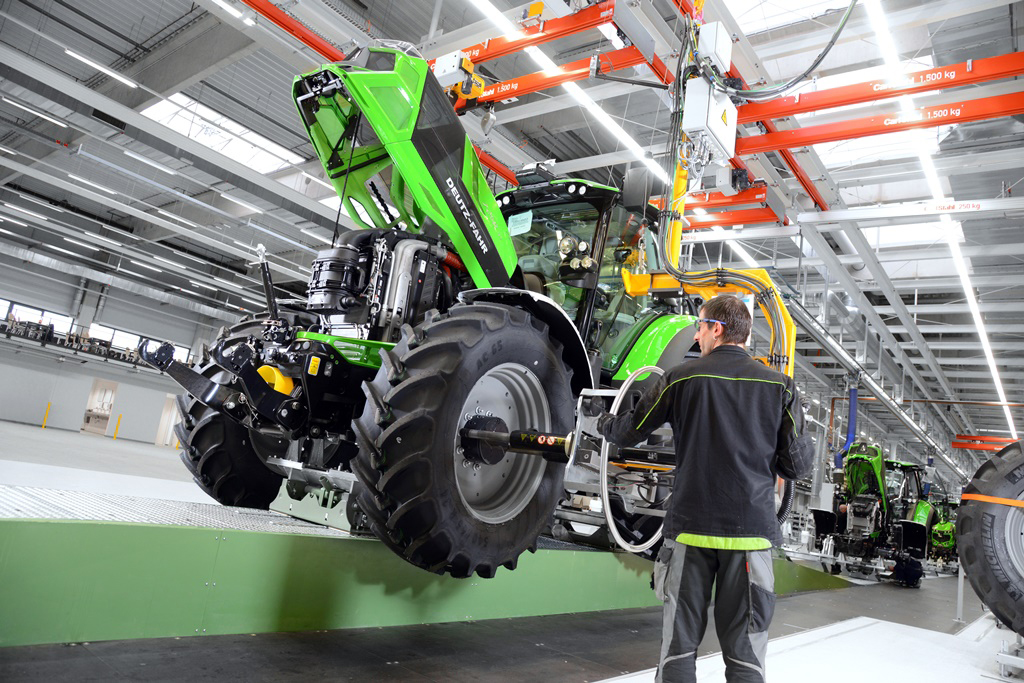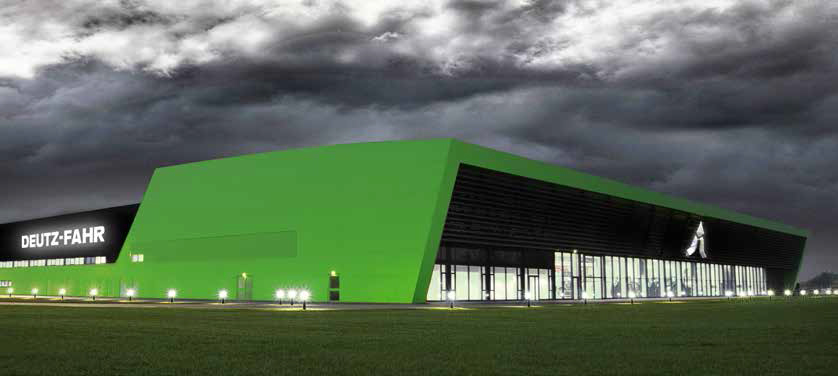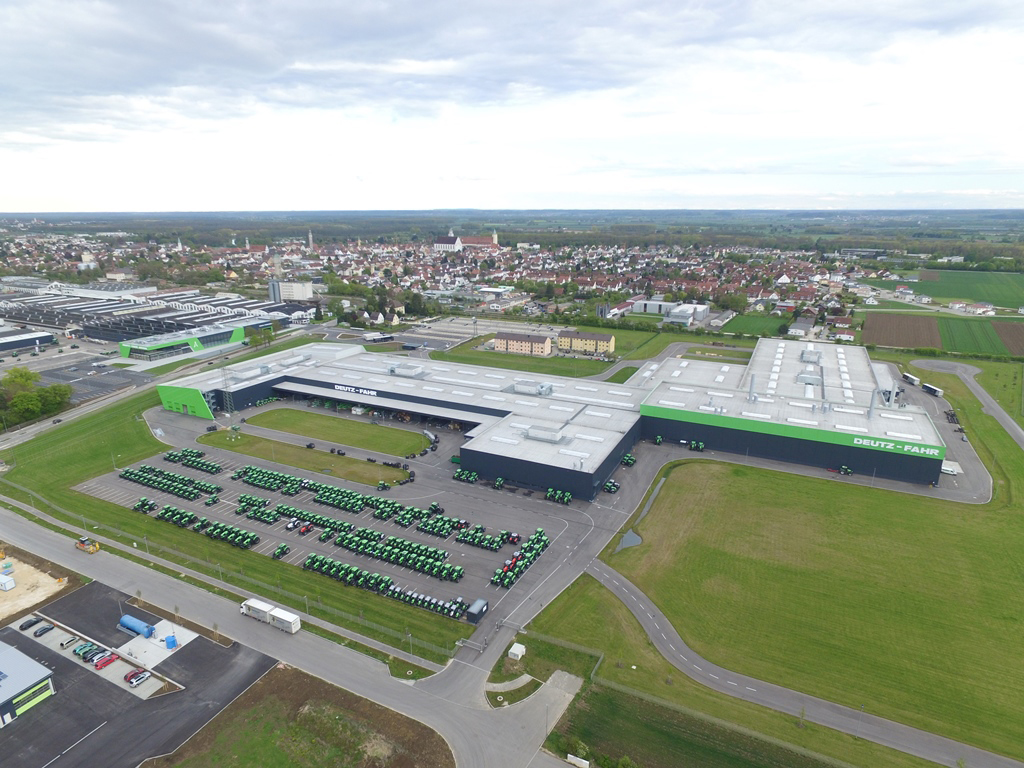
Press Release
DEUTZ-FAHR LAND: HIGH-TECH “MADE IN GERMANY”
May 10, 2017




1 / 3
The most modern tractor factory has started production.
After around three years of planning and construction time, the new tractor factory “DEUTZ-FAHR Land” started the production of high performance tractors from 130 HP on schedule in January 2017. The 6 Series, 7 Series and 9 Series tractors are manufactured here for the worldwide market. DEUTZ-FAHR now has the most modern tractor factory.
A plot of 150,000 square metres adjacent to the existing premises was purchased for implementing the project. The L-shaped building, with a covered area of 42,000 square metres, revolutionises tractor manufacturing through the use of state-of-the-art technology in the areas of assembly and painting and for the hydraulics, electronics and chassis tests for quality assurance. Setting new benchmarks for efficiency, productivity, and quality in manufacturing.
Together with the new customer centre “DEUTZ-FAHR Arena”, the overall investment of 90 million euros is the single largest individual investment in the company history.
Precise planning before construction
Planning for the new factory began in 2013. All groundwork was laid for planning and building a new production facility, fully respecting the time table and for optimising the individual production steps to ensure efficient, productive, high quality manufacturing of high performance tractors.
Input from experts, along with a selection of members of the planning team were crucial to the success of the project. A team consisting of factory employees and advisers spent several sessions pacing off areas, collating data, making calculations and discussing numerous alternative solutions.
All planning steps were coordinated by these experts for agricultural technology until the new factory started operation. It was crucial for further success to simulate the new processes “live” first. At the so-called Design Laboratory – a training workshop set up specifically for this purpose – each workstation was developed together with experienced employees, tested on the product to be built, documented and then implemented at the new factory with support from employees. This provided optimum solutions and an immediate training plan while achieving a high level of acceptance among employees for their new working environment.
In line with the target of building the most modern production facilities for tractors, the following planning philosophies were implemented:
- Line back planning philosophy: The production line is the starting point of the planning process – all delivery processes are planned “backwards” to the point of origin. This means that all upstream organisational units adapt their processes to the production plan.
- In-line quality principle: Product quality has to be ensured during the entire production process. Accordingly, quality checks are integrated along the entire line to ensure maximum quality for the individual manufacturing steps.
- Form follows function: The form of the infrastructure follows the functions defined by the specified processes.
- Smart production: The organisational areas of production and logistics work together to allow not only ‘just-in-time’, but also ‘just-in-sequence’ production.
- Workplace standardisation: Standards for processes and equipment (tools, equipment, etc.) are the basis for ensuring efficient and high quality work procedures.
Efficient manufacturing with the highest quality
This set of principles therefore determines all processes to be planned, the selection of technology and the setup of a suitable infrastructure, while last but not least offering orientation for the necessary organisational structures. All in all, everything is new: products, processes, IT system environment and infrastructure.
The structure results from the design and arrangement of the assembly and logistics workshops.
- Assembly before painting
- Painting
- Assembly after painting
- Finishing area
- Central logistics terminal
- Social areas
- Heating system
Short paths direct material flow, coupled with simplified communication and a high level of flexibility through large workshops. Gates at the sides of the workshops allow direct delivery of large components to the assembly line with fewer handling steps, ensuring synchronised, smooth production with low material stock.
Perfectly synchronised factory logistics
A warehouse with 4,000 storage locations for large parts, and a small parts facility with 25,000 locations was integrated for supplying the production process. Logistics use proven elements of lean production, e.g. continuous movement of materials on trolleys, use of route trains, e-kanban goods call-off directly from the line and continuous visual management. Where material flows can be bundled economically, targeted automation was introduced: The backbone is an automatic small parts storage system for handling the standard small load carriers. It is designed as a shuttle warehouse which dynamically adapts to the throughputs varying throughout the day and the on going production process.
Pre-assembly and order picking zones for add-on parts – the so-called supermarkets – are located immediately next to the assembly lines in a herringbone pattern, ensuring customised production and avoiding long paths and searches as well as extended waiting times and the corresponding safety stock levels.
Within the production process, the design of assembly line technology is one of the fundamental challenges. It not only has to be extremely robust and account for the complicated installation situation, but also permit ‘just-in-sequence’ manufacturing, i.e. components are only delivered at the moment when they have to be installed on the line.
DEUTZ-FAHR has developed innovative solutions for this: The assembly line is designed as an apron conveyor with worker travel conveyors on both sides. Both move in parallel at the same speed, significantly facilitating the installation of parts on the tractor body while substantially reducing the daily walking distance. This ensures constant production quality.
Quality in the entire process
In addition to the individual quality checks at each installation step, in-line hydraulic testing and a pneumatic test take place at the end of powertrain production. Up to three powertrains can simultaneously be tested here for full functioning and tightness at a hydraulic operating pressure of 220 bar. Only once this thorough check is completed, the tractors move to the paint shop and then to final assembly.
After final assembly, the computer-controlled final acceptance of the completed tractor takes place. All functions of all installed components are tested individually for each tractor, while engine and transmission are run through different speeds and load conditions. The front axle and the front axle suspension are tested in the final phase, which is unique in tractor manufacturing.
Painting the powertrains to state-of-the-art standards
With an investment volume of 20 million euros, it is the largest individual investment within the factory. Here, the powertrains move through a mostly automated painting process which ensures the highest level of quality.
After manual masking (protecting selected components through targeted covering and closing off), the powertrains are cleaned by robots to remove oil, grease and contaminants. To shorten the first drying process before priming, the numerous cavities and recesses are blown out with special arms with seven joints and adjustable air nozzles. Then, two employees apply the primer. The subsequent top coat is applied by special paint robots. This process guarantees that all powertrains pass the standardised salt water spray test up to 720 hours without signs of corrosion. As a comparison: car manufacturers usually work with 240 hours in the salt spray test.
Combined heat and power plant for power supply
DEUTZ-FAHR Land has its own power supply. The combined heat and power plant generates the heat required for drying in the paint shop as well as the electricity for the entire production process. Production is designed so efficiently that the excess heat is used for heating the workshops and any electricity that is not needed is fed into the public grid.
Focus on work ergonomics
In addition to energy efficiency, working ergonomics are also a focus at the new factory. The consistent use of electric screwdrivers and wrenches, the provision of parts within direct reach of the workers, the use of lifting devices and specially developed load suspension equipment all facilitate the assembly of heavy components and ensure a high level of health and safety with constant product quality.
Ready for the future
With the new factory, DEUTZ-FAHR sets a milestone in manufacturing technology and, also reinforces its global player role in agriculture mechanisation. Lodovico Bussolati, SDF CEO: “The new factory is playing a crucial role in reinforcing the DEUTZ-FAHR brand in the global market. The new manufacturing plant together with our modern and innovative tractor range will speed up the growth of DEUTZ-FAHR”.
Andrea Paganelli, Industrial Executive Director: “Thanks to the passionate involvement of all relevant parties, be it external or internal, we now have the most modern tractor production plant”.
